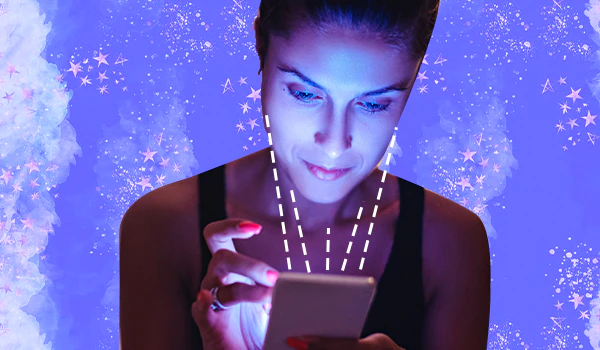You may already know that blue light is emitted from your smartphone screen and that this blue light can cause problems with eye tension in addition to affecting your sleep health. In the skin care community, blue light has other potential dangers: causing damage to your skin. The practice of blocking blue light has become trendy for this reason. Blue light is part of the spectrum of light seen for humans, and the sun itself emits blue light.
Although most often associated with gadgets, the amount of blue light originating from smartphones is very small compared to the level of sunlight. Does blue light pose a real danger to your skin? There is a minimum number of research that refers to “yes,” but not enough research has been conducted to say it. In this case, you might be wondering what exactly is blue light and how it has the potential to affect your health. This is what we know.
What is the blue light and dangers?
Blue light is the wavelength of light that is organically derived from the sun, but can be re -created with electronic devices. The light from the smartphone screen includes blue light, so that it allows humans to get this light throughout the hour throughout the day, not just when the sun rises. Blue light helps increase the level of mood and energy, which is why it is useful for us that it is in the sun, as explained by Harvard.
However, when we get exposure to blue light at night, this can cause problems. Because this type of light makes our brain more active, it can cause sleep disorders and disrupt your circadian rhythm and your natural sleep cycle. This is because the blue light activates the area that makes us feel stimulated, and this prevents melatonin production, chemicals released at night by our brains to make us feel sleepy, as recorded by the Sleep Foundation. The more this happens from time to time, the more likely to interact with your circadian rhythm and push you into the overall unhealthy sleep cycle.
Does blue skin damage the skin?
Sleeping health alone is enough reason to avoid excessive exposure to blue light, especially at night. But does this wavelength have an additional effect on the exposed skin? A 2015 study from the German University Hospital Charité – Universitätsmedizin Berlin reported the relationship between blue light on the skin and the increase in free radicals in the body, which is known to cause the effect of aging on the skin to occur faster. Another study from 2020 found that long -term exposure to blue light can cause more damage to DNA and cell and tissue death, although it records that blue light can also have a beneficial effect on the skin in some cases.
Another point to think about is that lack of sleep is known to cause many skin problems, as recorded by sleep.org. The link has been found between people who report bad sleep and higher amount of pimples. Stress caused by lack of sleep can have a negative effect on your immune system, also, making you more vulnerable to skin problems. Although the jury still comes out about how much blue light can directly affect your skin, the evidence shows that of course it might have an indirect negative impact.

